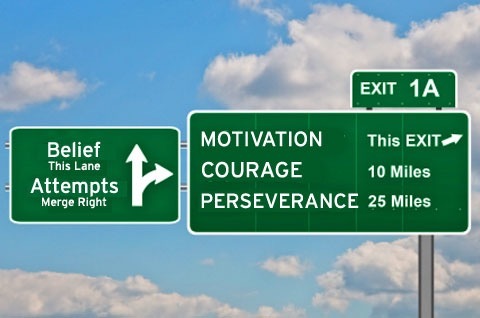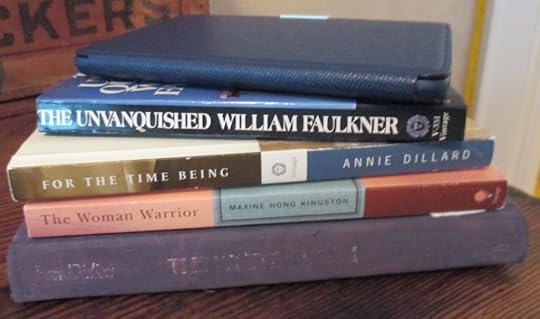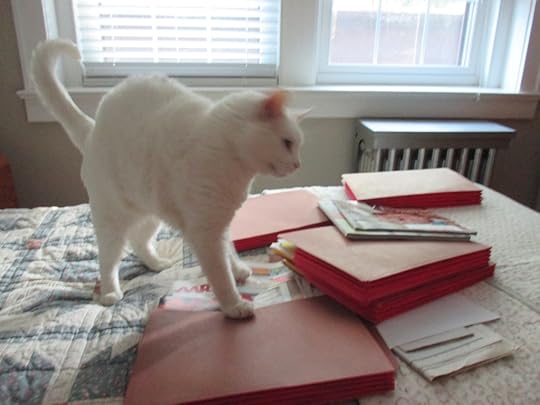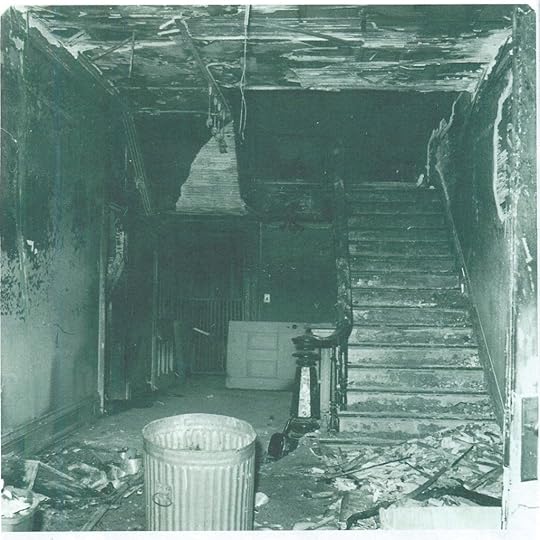Dean Robertson's Blog, page 16
July 17, 2015
Perseverance: Meet Mark Slauter, My First Guest Blogger

Meet Mark Slauter. Mark is a Certified Floodplain Manager with the Virginia Department of Emergency Management. During nearly three decades of professional life, he has been involved with a variety of environmental, land use, emergency management, floodplain management, and legislative projects and programs.
Recently, he decided to use a personal story to combine his experience in technical writing with his desire to try his hand at narrative.
This is his overview of his book, Diary of a Novice Investor: The Bullet Train to Wealth Left When?
“Dad dies and Mom has dementia. It’s now my responsibility to ensure Mom’s financial well-being. With minimal experience in managing a personal investment portfolio, I’m now forced to ask myself am I able? How can I execute my inexperience against the 100 years combined experience of my parents? There’s only one way to truly answer the question. By creating and managing a fictional stock portfolio I track my efforts against Mom’s portfolio. Money is made and lost. This story provides real world insights for people who have little or no experience with investing. Through my experience, you will be better prepared to take control of your own financial well-being. Conquer the fear.”
Welcome, Mark. And it’s over to you.
Perseverance
One of my favorite quotes comes from the movie “The Outlaw Josey Wales”, during a scene where an elderly gray-haired Native American is relaying a conversation between representatives of the Tribal Nations and the Secretary of Interior to the character Josey Wales (Clint Eastwood). The Tribal Nations Representatives met with the Secretary to complain about the condition of their peoples and the lands they were forced to live on. The Secretary’s response was, “Endeavor to persevere”.
Endeavor to persevere. It’s interesting how much meaning and power can be conveyed within seven syllables constituting three words. The Secretary didn’t really care what the Tribes did, it wasn’t his problem. The Tribes on the other hand, had endured sufficient hardships that they no longer desired to persevere.
Endeavoring to do something is the easy part. It doesn’t require much thought or energy to make an attempt. Perseverance is much harder, requiring a more conscious effort based on a mix of grit, guts, determination, stamina, and desire.
I was flattered when Dean asked me if I would be interested in posting a guest blog. Without hesitation, I said yes. She asked if there was anything in particular I wanted to write about. Without hesitation, I said perseverance. Why? Because it’s at the forefront of my being right now.
In 2013, I began an endeavor to write my first book. In June of 2015, I had surgery on my right shoulder (my good arm, of course) and have spent the past few weeks editing my book one-handed, just as I’m typing this post one-handed. Not that you should care that I did something one-handed, rather it’s illustrative of the desire to see a project through to its completion. That’s the payoff, the reward.
Success in whatever you do requires perseverance. Accomplishing what you set out to do is rewarding and along the way you learn, becoming a better, stronger person. If you garden, grow the best tasting vegetables. If you run, run the best time. If you write, write the best piece. Even when it’s not the best, do it anyway, you’ll thank yourself.
July 1, 2015
My Authors; Myself. Influences on “Looking for Lydia”

SPOILER ALERT!! This blog is way too long. Try to bear with me and read it anyway, and BE WARNED: never ask me about my favorite authors!!
Asked any question remotely related to “Who is your favorite author?” I freeze. I can have 200 favorite authors, or on a bad day I might have none, but never one. I believe the exact question in this case, taken from Amanda Patterson’s excellent list of “30 Inspiring Blog Post Ideas for Writers” (http://writerswrite.co.za/30-inspirin...), is “Who has influenced you as a writer?” Ms. Patterson further suggests that, if I choose this Idea, I might consider quotations from the author, or a catalogue of 10 things I’ve learned from her or him.
Without a moment’s hesitation, I pulled four books and my Kindle from the shelf. No point in wasting time on decisions. They are Joan Didion’s essays, from Slouching Towards Bethlehem to her memoir of her husband’s death, The Year of Magical Thinking; Maxine Hong Kingston’s The Woman Warrior; Annie Dillard’s For the Time Being; William Faulkner’s The Unvanquished; and Rudyard Kipling’s The Jungle Books.
Rudyard Kipling. The Jungle Books.
From Kipling’s stories I learned early the irresistible music and beauty of stories read aloud. My father read to me; I read to my son; I am reading to my grandson. I edit my own writing by reading it out loud to myself. I have taught students for thirty years to proofread their own essays by reading them aloud, and repeatedly.
“It was seven o’clock of a very warm evening in the Seeonee hills when Father Wolf woke up from his day’s rest, scratched himself, yawned, and spread out his paws one after the other to get rid of the sleepy feeling in their tips” (“Mowgli’s Brothers,” paragraph one).
“It is a Wednesday morning in April of 2014, and I am looking out my windows, old casements in a 1928 building in an urban neighborhood in Norfolk, Virginia, waiting for a door-to-door car service provided by the area’s public bus company” ( Looking for Lydia, paragraph one ).
“Stories are meant to be heard and felt. One of my fondest memories from childhood is my father’s reading to me at night. I only wanted to hear one book, an old volume of Rudyard Kipling’s The Jungle Books. We lived on two hundred acres of north Georgia woods and my fantasy life consisted almost entirely of becoming Mowgli, the child raised by wolves, the child whose best friends, Baloo and Bagheera, were a great brown bear and a sleek and dangerous black panther. I read “Rikki-Tikki-Tavi” and longed for a mongoose. I remember very little about my father, a kind but distant man who died when I was sixteen, but I can still hear his voice, half a century later, reading those stories” (Looking for Lydia).
William Faulkner. The Unvanquished. Faulkner taught me that writing can be like the layers on the floor of the woods where I grew up, each year’s leaves and dirt spread smoothly on top of the year before, creating the rich mix of moss and loam whose odor of sweetness and rot is elusive to those who don’t understand the South’s peculiar relationship to time.
“I should have known; I should have been prepared. Or maybe I was prepared because I remember how I closed the book carefully, even marking the place, before I rose. He (Professor Wilkins) was doing something, bustling at something; it was my hat and cloak which he handed me and which I took although I would not need the cloak, unless even then I was thinking (although it was October, the equinox had not occurred) that the rains and the cool weather would arrive before I should see this room again and so I would need the cloak anyway to return to it if I returned, thinking, ‘God, if he had only done this last night, flung that door crashing and bouncing against the stop last night without knocking so I could have gotten there before it happened, been there when it did, beside him on whatever spot, wherever it was that he would have to fall and lie in the dust and dirt” (The Unvanquished).
“In 1915, Margaret Roper married, and she and her husband lived in the outside house, facing Dunmore Street. Virginia lived in the inside house until her death in 1945. In the spring of 1946 Leighton and Molly moved into Virginia’s house with their family: young Leighton was six; Albert was four; Molly was pregnant with her daughter, Molly, who is my age. In 1966, Margaret died, at the age of one hundred, a resident of the Lydia Roper Home. In 1972, Leighton Roper died; in 1999, his wife, Molly, died. The family sold the double-house. The house that Captain John Roper purchased for himself and Lydia was demolished in 1941.
****
Today I am at home. I send out emails and am drowned in responses” (Looking for Lydia).
“Joan Didion, Annie Dillard, Maxine Hong Kingston
From Joan Didion I learned how to construct and control a deliciously complicated sentence and how to use deliberate repetition–of a word, a phrase, a grammatical structure–to make a point (and to make music). I learned to lay out my pages of fiction as poets arrange their poems, for visual as well as verbal effect; I learned to use white space.
I learned to appreciate those spaces and to use them to thread together unlikely partners in topic and meaning in a way that made their partnership evident. I learned to write about apparently disparate topics the way the lecturer at a slide show flashes each painting on the screen, without commentary. I learned to write about many realities in the same larger reality, like Maxine Hong Kingston writing about her modern childhood in a California Chinatown, her parents’ history in China, and the stories of ghosts and mythical warriors she heard growing up. Many threads, one fabric. I read and I learned.
Annie Dillard‘s, For the Time Being, perhaps more than any other book I’ve read, called me to the writing life. She tossed out Buddhist sayings and Christian shrines, the priest, Teilhard, the ancient Rabbi Isaac Luria, clay statues in China, obstetrical wards, a book about birth defects, tsunamis and death, sand, Israel, clouds, and numbers-and made it work. Made it work so well that I continue to read this book at least once a year, every year since the first time. The text here is unedited; the white spaces are hers.
“According to Inuit culture in Greenland, a person possesses six or seven souls. The souls take the form of tiny people scattered throughout the body.
Do you suffer what a French paleontologist called ‘the distress that makes human wills founder daily under the crushing number of living things and stars’? For the world is as glorious as ever, and exalting, but for credibility’s sake let’s start with the bad news.
An infant is a pucker of the earth’s thin skin; so are we. We arise like budding yeasts and break off; we forget our beginnings. A mammal swells and circles and lays him down. You and I have finished swelling; our circling periods are playing out, but we can still leave footprints in a trail whose end we do not know.
Buddhism notes that it is always a mistake to think your soul can go it alone” (For the Time Being).
Didion’s The Year of Magical Thinking has something on every page to influence the writer who reads. Here is one of those somethings.
“December 30, 2003, a Tuesday.
We had seen Quintana in the sixth-floor ICU at Beth Israel North.
We had come home.
We had discussed whether to go out for dinner or eat in.
I said I would build a fire, we could eat in.
I built the fire, I started dinner, I asked John if he wanted a drink.
I got him a Scotch. . .
The book he was reading was by David Fromkin. . .
I finished getting dinner. . .
John was talking, then he wasn’t. . .”
“I have found some wonderful stories, but I have not found Lydia Roper’s story. I am not ready to give up. I am not ready to give up because I have fallen in love with this woman whose story I have failed to find. I am not ready to give up because this has become a search for stories. At the Lydia Roper Home, we are reading stories and telling stories and listening to stories. We are coming to understand that stories, like names, are important, and our list of stories is getting longer. It does not include Lydia’s story.
I am not ready to give up looking for Lydia because I want to know what Lydia was looking for. What did she want? What dream was she chasing? What did she get?
Toward the end of a cold winter, the ladies at the Roper Home and I were looking for a better understanding of the Bible, or for companionship, or just for a way to spend a couple of hours a week. I was looking to survive; maybe we all were. Now we are also looking for Lydia.
I am not ready to give up” (Looking for Lydia).
THE END
June 20, 2015
Ragdolls and Maine Coons: Comfort for my Cousin

I received a phone call from my cousin, Marcia, this evening. She’s feeling low and knows-as we both do-the comfort that can only come from a small warm Animal Presence in our homes and in our beds. She remembered my mentioning Ragdolls years ago when I was ready to replace my dear little Persian, Abraham. In my case, Fate intervened in the person of a terrible-looking white cat who would become Isaac. Isaac was every single thing I did not want–he was grown; he was white; he was short-haired. What I wanted, and was in fact shopping for, was a Ragdoll kitten. What I got was about the best cat I’ve ever had. Isaac showed up on my doorstep, looking like a train wreck, and he has seen me through some very hard times. Marcia is one of the few people who understood my severe depression and called to check on me at least once a week for nearly a year. Now she needs a cat to see her through.
On the telephone last evening we also talked about Maine Coons because I had mentioned that they don’t shed. I was introduced to Maine Coons because my cousin, Colleen, on the other side of my family had two of them.
So, I recommended that Marcia do some online research about the two breeds to help her in making a choice. Since I’m on the computer a great deal these days, and since it’s now 5:15 in the morning on Saturday and I woke up for the day around 1:30, have been working steadily since then, posting here, sending out emails about book signings and reviews, and am running out of steam for any more thinking, I’m going to do some casting around for kitty cat information. Pure recreation.
Ragdolls: I just spent thirty minutes mesmerized by images of Ragdolls, one of which is at the top of this post. Now I remember why I wanted one. They are not only beautiful; they have the temperament of angels. They come with a variety of markings in an array of unusual colors. I even met a 20 pound Ragdoll once who was solid black and lived on the counter of a jewelry shop in Michigan. These creatures are called Ragdolls because they are so relaxed that they just flop when you pick them up. Like rag dolls.
I’d recommend good old Wikipedia for the easiest access to the basic information about these cats. But if you type “Ragdoll” into your search engine, you’ll find scores of special sites. And always check out Cat Fanciers Association, which I’ve used for Maine Coons below. If Isaac hadn’t been written in my stars, I’d go straight back to Ragdolls.
Now, Maine Coons–Go straight to Cat Fanciers.
And then some irresistible photographs:
 It’s now 6:30 and dawn is breaking over the Ghent neighborhood of Norfolk, Virginia. Isaac is snoring away in his Pink Thing right next to my desk. I’m ready for a break and a decision: climb back into bed; brew a cup of chai latte on my Keurig and read for a while; take a shower and call a friend to pick me up for an 8:00 meeting (a friend who, if she comes by, will bring me a huge slice of cake). I wonder if it’s possible to select “All of the Above.”
It’s now 6:30 and dawn is breaking over the Ghent neighborhood of Norfolk, Virginia. Isaac is snoring away in his Pink Thing right next to my desk. I’m ready for a break and a decision: climb back into bed; brew a cup of chai latte on my Keurig and read for a while; take a shower and call a friend to pick me up for an 8:00 meeting (a friend who, if she comes by, will bring me a huge slice of cake). I wonder if it’s possible to select “All of the Above.”
Marcia, here are your cats!!
A Bishop, A Bottle, A Bicycle: Old News Remembered

In January of 2015 I published this short piece on a blog called American News X managed by a former student with whom I connected on Facebook. Thomas Clay and I hadn’t spoken in thirty years. He did me the honor and the service of asking me to write for his blog at a time when I had just finished Looking for Lydia and was putting together lists of small publishers and agencies, typing endless book proposals, and sending the manuscript out into the world.
This essay about the Bishop was the first thing I wrote for the blog. My personal interest is evident. Reading it over and remembering the incident–which has, in the way of American news, disappeared from the media–I am touched all over again. I also realize that I don’t know what the resolution was. And that’s a blog for another day.
Very Personal Impressions of the Unforgivable: A Bishop, A Bottle, A Bicycle
I am a cradle Episcopalian and I believe all roads lead to God; I am a woman; I am a recovering alcoholic; my mother was an alcoholic; all my aunts and my uncle were alcoholics; my grandmother was an alcoholic.
On Saturday December 27, in the final days of 2014, Bishop Suffragan Heather Elizabeth Cook, Maryland’s first female Bishop, struck and killed bicyclist Thomas Palermo. Cook drove away from the scene but returned—after either twenty minutes or forty-five minutes, depending on which account you read. Reports from the cycling community claim that Bishop Cook returned only because she was pursued by other cyclists. However it happened, Bishop Cook drove away from the man she had killed. Later accounts confirmed that the Bishop had been drinking and that in 2010 she was pulled over by police and was, according to an article in The Washington Post, “too intoxicated to complete sobriety tests” (Boorstein and Shapiro, 12/30/14).
Bishop Cook’s father, the late Rev. Halsey Cook, was an Episcopal priest and an alcoholic. According to The Baltimore Sun in 1977, Cook said from the pulpit: “I am an alcoholic.” Bishop Heather Elizabeth Cook’s father was well known for his work in fighting alcoholism in the ministry.
The first account of the hit and run I saw was written below a photograph of the Bishop in the middle of a service, arms outstretched, mouth open, doing what priests do—reading the liturgy, preaching a sermon.
.
I saw the collar, and the purple, and the woman’s face.
And I saw, in memory, the face of another woman, above that purple.
In 1986, Geralyn Wolf, twelfth Bishop of Rhode Island (1996-2011), was ordained Dean of Christ Church Cathedral in Louisville, Kentucky. She was the first woman Dean of a Cathedral in the Episcopal Church. I was forty years old and teaching at a small private high school in Louisville. On the altar that day were Dean Wolf, newly ordained; Helen Jones, a Deacon; and an acolyte, a young girl. It was the first time I had seen, or even imagined, women at the altar, in the beautiful vestments of the Episcopal clergy, doing what women do: serving a meal. If I remember correctly, the host wasn’t the usual wafer but a fat loaf of homemade bread. I watched the women’s hands breaking it into chunks for the Lord’s Supper.
The Church and my recovery from alcoholism tell me that forgiveness is at the core of the spiritual life. Like everyone else who saw that photograph and read that story, I find it very difficult to forgive Bishop Cook for the unnecessary death of Thomas Palermo. Some days, nearly twenty-nine years away from my last drink, I find it nearly impossible to forgive myself for the times I got behind the wheel of a car filled with too much alcohol.
What we want here probably depends on where we are: Bishop Cook locked up forever; Bishop Cook getting some consideration because of the disease of alcoholism. We want this one nightmare not to mean that women shouldn’t be bishops. Nothing sounds right. What we want here is Thomas Palermo alive; the Bishop, like her father, sober.
A statement from the Maryland diocese reads, in part, “We, too, are all filled with questions for which there are still no answers, and we are all filled with with anger, bitterness, pain and tears.”
I don’t feel confident that those words will mean much to the family of Thomas Palermo.
Bishop Cook will likely be remembered for her hit-and-run killing of a young father; Bishop Wolf is known for the month she spent on the streets of Providence, Rhode Island, living with the homeless (Geralyn Wolf. Down and Out in Providence: Memoir of a Homeless Bishop). Both will be remembered because they are women.
June 19, 2015
Comments Now Possible: Please Do

For those of us who couldn’t figure out how to make comments on my blogs, take comfort from the fact that it wasn’t possible.
A consultation via email with my web designer produced results. The fix is in.
Next to the little heart at the bottom of each post, where you can “like” what I’ve written, is an equally tiny speech “balloon.” Click on that and-like magic-a comments box should appear.
Good luck to us all. And to all a goodnight.
Do I Dare to Eat a Peach? L or l? . or ;? .” or “.?

Sure enough, here it came, with a warning, “Corrections Only.”
Working all afternoon, I got it back to them late today. I struggled with questions of capitalization: incarnation or Incarnation; resurrection or Resurrection? I consulted the Book of Common Prayer; I consulted several tomes of biblical criticism; I consulted Google. The consensus is that there’s not one. After a quick consult with Molly, I decided that the only thing that mattered was consistency. I began to scan for these words, catching most of them–I hope–and missing, I am certain, all kinds of punctuation problems.
There is no question about the source of these troubles. As I write, I recognize each crossroads where a choice must be made. Based on my reading and teaching over many years, I make that choice and keep writing. When the same choice presents itself again, again I make it. I don’t always make the same choice. I have lists of rules and examples in my mental file cabinet and, each time a decision is called for, I pull them out. The problem arises because I apparently shuffle those differently, often resulting in different choices. On one page it’s “Incarnation”; twenty pages along, “incarnation” makes more sense. I can explain each decision. I think that sometimes it is just a function of my mood of the day.
The truth is that I am not a good proofreader. Decades ago I actually failed the test for a job as a proofreader for National Geographic. I just can’t focus, visually or mentally, on those tiny commas and parentheses. My eyes water; my attention wanders to the proverbial grocery list; I get uncontrollably sleepy, almost literally dropping onto the keyboard. I become desperate; I walk around; I consume Diet Coke. None of these works. I am bored. I am an intuitive grammarian, my writing grammatically pristine most of the time. This is the result of a lifetime of reading. Those lists of rules in my head are a jumbled mess; that file cabinet needs a good sorting and labeling.
I am a terrible proofreader.
At this critical point in time, I have no idea what to do about it.
I would welcome suggestions!!
June 18, 2015
20 or 30 Corrections. Then 8. Then 2. Then we go

Late yesterday, I received from Koehler Books the most recent edited copy of the book, Looking for Lydia; Looking for God. It incorporates my latest changes and corrections. I can no longer call this a manuscript; it is undeniably a book. The email from my publisher, to which the book is attached, reads:
“Dean,
Here you go. I expect you will narrow this down to 20-30 corrections. Then 8. Then 2. Then we go. That’s how it works.
Rock and roll.”
I worked until nearly midnight, slept an hour or so, worked again, and again around 3:00. I actually said ‘No’ to keeping my grandson for a couple of hours today. Now it is 6:03 AM, according to my oven clock, and I am about to walk to the market before the heat closes everything down. Then back to work until I can send the book back to Koehler Books for the next round. I am getting into the rhythm; I get it. This is how it works.
The clock has ticked and it is almost 2:00 in the afternoon. I am only halfway through. I have washed my favorite bathmats, put together ingredients for a crockpot meal for tomorrow, talked at length with friends in Louisville, Kentucky, and Grand Rapids, Michigan, arranging with them to arrange my “dates” for book signings in their cities. I can’t make plane reservations until all these travel arrangements fall into place. The falling dominoes need to begin in Texas.
I believe this telephone and email activity falls soundly into the category of “marketing” which I vowed not to tackle, or even approach cautiously, until the book work was complete. Yet here I am. And I really want to get the book back today so they can turn it around and back again to me quickly. All this work and pressure stem from one fact: the faster I work, the sooner the book will appear. The sooner the book appears, after the miserable two + months’ delay, the surer I can be of getting enough copies for the book launch and signing on September 12. Yes, I know.
Back to work. Phone ringer is off.
Thursday 18 June 2015 (yes, it’s still 2015)
I finished the job and shipped it off. I got a very formal phone call from my publisher. Way, way, way too many “edits” (as opposed to what I was supposed to be doing–“corrections” only. What author can resist the opportunity to do just that little bit of tinkering, that tad of rewording (checking the Thesaurus one more time), that addition of a few sentences, possibly a short paragraph which really does enrich, clarify, improve? Don’t we want it to be the best it can be?? Apparently I had the chance for rewrites a while back and it’s now time to PUBLISH A BOOK.
Like a wasting flame, in well under an hour (closer to a half hour), I blitzed through and zapped as much excess as I could even spot at that speed.
And sent that sucker back.
Now I’m waiting. Spent a delightful couple of hours with a friend discussing a fascinating book we both just read, Ishiguro’s Buried Giant, stirred my crockpot meal, washed a couple of dishes, made a couple of calls (yes, about marketing), and am now definitely going to watch a couple more episodes of “Grace and Frankie.” I’m even considering a nap.
Life is still good. And certainly it’s not boring.
June 14, 2015
Sometimes, the Ashes; Sometimes, the Phoenix

Let’s face it. We plan; God laughs. And She’s got quite an impressive belly laugh where I’m concerned.
THE WEEK BEHIND, THE WEEKS AHEAD: THINGS DONE, THINGS LEFT UNDONE
1. Copy edited manuscript arrived on Sunday evening, a week ago
2. I pushed hard, as is my usual compulsive approach, had finished a line-by-line and sent it to Koehler by Tuesday night.
3. Koehler Books, as is their habit, had it back to me, in layout form (It looks like a book!!!) on Thursday morning.
4. When I saw it I was ecstatic; it’s gorgeous.
5. By the time I got past the title page and was glancing at the Author’s Note, I knew something was wrong. I took a breath and went on a few pages into the text.
6. None of my responses to the copy editor, none of my changes, had gone through. I was looking basically at an unedited, but beautiful, book.
7. I sent a panicked email to John. He called. We both panicked. We settled down and surveyed the damange.
8. The only possible solution was for me to put my copy of the correctly edited manuscript on my screen next to the uncorrected book and do the entire thing over, one word at a time.
9. First I had to upgrade my Adobe Reader and watch a video intended to orient me in their Sticky Notes system that allows editing on a pdf file. I did that.
10. I worked late Friday night and all morning yesterday. Then I got an email from my son asking if I could keep my 7 week old grandson for a few hours so they could run errands. Obviously, the answer should have been no. Seriously? We napped, played, and listened to Nadja Salerno-Sonenberg play Tchaikovsky’s Old Warhorse. This little boy loves music.
11. I worked until 11:30 last night, woke up at around 1:00, worked until 4:00, went back to bed and slept until 5:30, walked to the market at 6:00, and went back to work.
12. An hour ago, at around 10:30 AM, EST, I completed what I now see is NOT the final editing but the editing before the editing before the Final Editing. John says we keep at it until we have it right. I agree.
13. Meanwhile, somewhere back in the dim past–a week ago yesterday–a student from 25 years ago came through for an overnight having just returned from a cousin’s wedding in Bombay. He brought me singing bowls. They are second only to holding a baby for facilitating mindfulness and meditation.
14. Ahead today: several items under the heading of Household Yoga. Maybe a couple more episodes of “Grace and Frankie.”
15. Tomorrow I will make a few personal calls, answer a few emails, and begin the process of marketing by looking over my list of things to do about that. I have a grand marketing plan, thanks to friends in several states where I’ll be scheduled for book signings at book stores and assisted living facilities. I have leads to follow up here in Norfolk. I will do that until the book comes back for more work.
THE WEEK BEHIND, THE WEEKS AHEAD: THE IMPORTANT STUFF
Coming up is a lot of in the world stuff-travel, book signings, people, people, people. Phone calls first-and a lot of them. Then Lord-knows-what.
A commitment to be a good steward of my mental and physical health is vital to balance that energy going out:
1. Early morning walk, 45 minutes round trip through a lovely neighborhood of late 19th and early 20th century homes.
2. A half hour of practice with the singing bowls.
3. The St. Francis prayer
4. Spending time with the baby. I anticipate it’s being wearing but, yesterday for example, after he left I found myself breathing more deeply, aware of relaxed muscles, and utterly focused and energized to work until nearly midnight with no strain or effort.
5. Helping a friend with her writing.
6. Getting to all my meetings.
7. Taking life easy. It’s all good.
June 7, 2015
A Little Break: Am I Relaxing Yet?

Good morning to all you Lovers of Lydia,
I am beginning to suspect that I’m taking a couple of days off and–relaxing? It’s an unfamiliar feeling. There’s nagging tension that the Copy Editor hasn’t sent the Edited Copy, but her stated deadline was “no later than June 8.” That would be tomorrow. Is it possible that there are people in the world who are relaxed enough that when they say June 8 they don’t mean June 5th or 6th? Who don’t do what I did week before last–promise end of business Friday and drive myself nearly into the ground so I could get it there on Wednesday? I have already addressed that behavior in an earlier blog.
I am pretty sure I did some relaxing things over the weekend. A former student from (only) 25 years ago, with whom I have reconnected on The Evil Facebook (more on that on another day), got in Friday evening and spent the night. We ate pork roast with green beans and whole berry cranberry sauce, simmered all day, from bowls on our laps (the table I purchased in order to stop eating on my lap is covered with notebooks, file folders, and large reference volumes). After dinner we walked across the street, bought two pints of Talenti Alphonso Mango Sorbetto and ate those on our laps with no bowls; we ate straight out of the cartons with large spoons. I found out that Alphonso mangoes are the finest mangoes in all of India.
My student, a native of India himself, had just returned from a trip to visit family and to attend a cousin’s wedding. He presented me with two Tibetan singing bowls, with wooden mallets. I owned one of these bowls a few decades ago and, having watched him make them sing, I was convinced that I remembered the technique. My brain probably does; my hands and arms–not yet. I’ve been practicing this morning. This activity is an ultimate source of relaxation–because it requires absolute concentration. If I stop concentrating, the bowl stops singing.
Yesterday, after Sweth left, I walked to my son’s house to spend time with my new grandson and with cousins who are visiting and were scheduled to leave this morning. Everyone had a shot at the small singing bowl.
I have gotten out my calendar this morning and, depending on a couple of pieces of information I need from Koehler Books, I am ready to start ticket-shopping for my book signings at book stores and assisted living facilities in four cities in the Southwest, Midwest, and South.
A little relaxation mixed with enough work so I don’t suddenly go crazy. And, I’m printing photographs. For this blog today, I’ve decided on a screenshot of my desktop.
June 5, 2015
Waiting; Editing and Marketing; Bible Study; Marketing and Editing and Waiting

I am waiting again. On Wednesday of last week I submitted an edited and reworked manuscript to Koehler Books and set up a dropbox containing all the images for my book. The manuscript went to the copy editor, who is doing whatever copy editors do–in this case, I hope that’s nothing radical. An email from her promises her edited copy in my hands no later than Monday. I am hoping it will come today so I can work on it over the weekend. I have until the 11th to complete my read-through. I am waiting again.
In the meantime, I have this other life and self. I have a new grandson. I talk with my cousin Jane, who lives in Mansfield, Texas, every morning and we do some form of spiritual discipline or devotion. We both subscribe to the lectionary for daily mass from USCCB (United States Conference of Catholic Bishops) and sometimes read the Scriptures for the day aloud and talk about them. Other times, we venture further. We have recently read all of John’s Gospel, a chapter a day, with plenty of time for discussion. One of the habits I carry with me from the years of my professional teaching career, and from my recent volunteer work at the Lydia Roper Home that was the inspiration for this book, and from similar work in various churches and other venues over many years, I automatically start “prepping” any text I’m reading. In the case of my daily spiritual sprints with my cousin, it means we have access to all that information about the historical context in which the text was written and read and about the development of interpretations of the text over time. So we’re doing a pretty thorough job on the Scriptures.
Next up is Revelation, and I knew I would need a good basic text about that particular book of the New Testament. As luck would have it, my favorite Bible scholar is Elaine Pagels and, unknown to me until last month, she has written a wonderful book on Revelation. The title is Revelations: Visions, Prophecy, & Politics in the Book of Revelation. We are taking it a chapter at a time, and it is exactly what I was looking for. She really does almost a chapter by chapter summary and reading of Revelation, fully situated in the context of its time and place. This English Teacher approach to Scripture fills a need in me, connects me to this powerful religious text, and keeps me working. The close reading of texts is what I do. If I didn’t have a literary text I’d probably be forced to do a close reading of the oatmeal box!
This work on John’s Gospel and Revelation is also preliminary work for my volunteering to discuss Scripture in the Adult Education hour at a local Episcopal church in the Fall. All things work for good. . .
Then there’s my new grandson which consumes exactly as much time as my children will allow me. So far it’s been more and better than I could have hoped. Yesterday he was here, complaining about this and that, eating and sleeping and all that other stuff six week old babies do, from around 3:00 in the afternoon until 8:00 last night. I loved every minute although I do confess to a fleeting question as to what exactly it was about screaming and dirty diapers that I missed 
On the subject of pacing, I have learned that I am not a “multi-tasker.” I simply cannot think about my now solid notes on marketing while I’m waiting to work on my book again. So, I have decided to set those notes aside until next week’s editing. After that, I have a large number of concrete leads–book stores, local television and radio interview shows, historic preservation associations, etc.–and the phone numbers and contact people to follow them up. All I have to do is change gears, do a little preliminary homework, and pick up the phone.
This writing business and especially this publishing business are giving me an entirely new experience. At age sixty-nine and change, can this be the beginning of a different life? Today a friend from my recovery program (29 years and counting!!) will be here for an hour; I have a phone date with a former student who is now Editor-in-Chief of a major gourmet food magazine; and late in the afternoon another former student, also from thirty years ago, is arriving for an overnight visit. Tomorrow I will see my son, my daughter-in-law, our two cousins who are visiting from Baton Rouge, and my grandson.
And I will be waiting.







